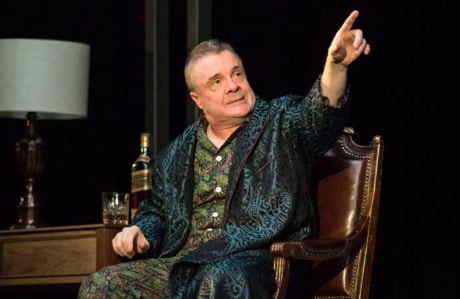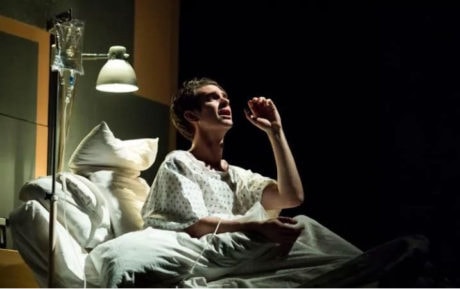Tony Kushner divided his epic play, Angels in America, into two parts. The second half, subtitled Perestroika, was beamed live to cinemas worldwide on July 27 from London’s National Theatre where it’s in the midst of a sold-out run.
This play, lasting four-and-a-quarter hours, starts with a monologue, just as the first half did.

Kushner’s script has hardly any soliloquies where a character reveals his inner thoughts, in asides, to the audience. Instead, almost all of the talk is in conversations between the garrulous characters. One exception is a rabbi’s eulogy at the start of Part One upon the death of the grandmother of one of the leading players.
This scene is important because the rabbi points out the significance of the journey the old woman made from Europe many years before; a great journey which portends the journey which the characters are going to undertake in these plays, and a journey — a transformation — which Kushner calls upon America to make.
The start of Part Two has a counterpart, a speech by “the world’s oldest living bolshevik” who bemoans the failure of the noble experiment of bolshevism (the Soviet form of socialism). He regrets the fact that Russia is imitating America with its cheeseburgers and other manifestations of capitalism.
Perestroika (Russian for “restructuring”) was the reform political movement led by Mikhail Gorbachev which led to the end of the Soviet Union. Perestroika, the play, picks up where Part One ended. Two men are dying of AIDS. They are polar opposites. Prior Walter (Andrew Garfield) is a respected member of New York’s gay community and Roy Cohn (Nathan Lane) is a closeted, powerful right-wing politician. A romance is in progress between Joe Pitt (Russell Tovey) who is the protégé of Cohn, and Louis Ironson (James McArdle), the ex-lover of Prior, while Pitt’s wife Hannah (Denise Gough) escapes into drug use.
But plot details are relatively unimportant because Angels is more a fantasy than it is a narrative. Kushner’s ruminations are more important than the specifics of what happens. His subtitle, appropriately, is A Gay Fantasia on National Themes, with the accent on fantasia.
Three of the most fantastic scenes are in Part Two: Harper’s delusional trip to Antarctica, which prompts a discussion of the ozone layer and other environmental issues (written in 1990!); Louis’s delirious look at a diorama in the Mormon informational center in Manhattan, which provides historical background on Mormonism; and a visit to heaven where we see and hear a clash between passive acceptance and a return to harsh reality where one can deal with painful issues.

Kushner, a secular Jew, seems to be saying that the idea of heaven is all well and good but what’s more important is to stay on earth as long as one can, and continue to fight against illness and injustice. The idea of pioneer Mormons crossing the prairie, incidentally, provides an interesting link with the immigrant European Jews making their trans-Atlantic journey.
Dramatic confrontations in Part Two are combative. Especially gripping are Prior’s disputatious reunion with Louis, Cohn’s bullying of his drag-queen nurse Belize (Nathan Stewart-Jarrett), Belize’s take-down of Louis for his hypocrisy, and Cohn’s excruciating death scene where the ghost of Ethel Rosenberg gets the last laugh at the manipulator who intervened with a judge and insured that Ethel was electrocuted after her conviction for spying.
Playgoers should note the mitigating factor that Ethel and her husband passed secrets to Russia when it was America’s ally in World War II, not to an enemy nation; but Cohn was hostile to any clemency, and he prevailed.
Sparks fly during each of those confrontations, and there’s sassy humor. The acting of Garfield, Lane and McArdle rise to eloquent heights here. Garfield in particular is haunting and spellbinding.
A deficiency in proper American accents by a few cast members is puzzling, especially in contrast to the perfect American speech by the Irish Gough and the Scottish McArdle. My other reservation concerns Amanda Lawrence’s appearance as The Angel. I don’t like to pick on actors for their looks, but I regret that Lawrence appears to be plain and skinny, because she is supposed to be so voluptuous and seductive that Prior, even though he’s gay, gets erections and ejaculates whenever he sees her. It’s in the script.
Marianne Elliott’s direction and Ian MacNeil‘s sets reach their best when a glowing ladder descends to transport Prior to heaven, and in the subsequent scene in heaven.
Running Time: Four hours and 15 minutes, including two intermissions.
Angels in America: A Gay Fantasia on National Themes plays through August 19, 2017, at the National Theatre, London. The first part, Angels in America: Millennium Approaches, was presented by Fathom Events live in HD at selected cinemas on July 20, 2017. Part two, Angels in America: Perestroika, was shown live in cinemas on July 27, 2017. Encores of both parts will be announced for selected locations. Tickets to the HD screenings can be ordered online.
Read Steve’s review of Angels in America: Millennium Approaches here.




